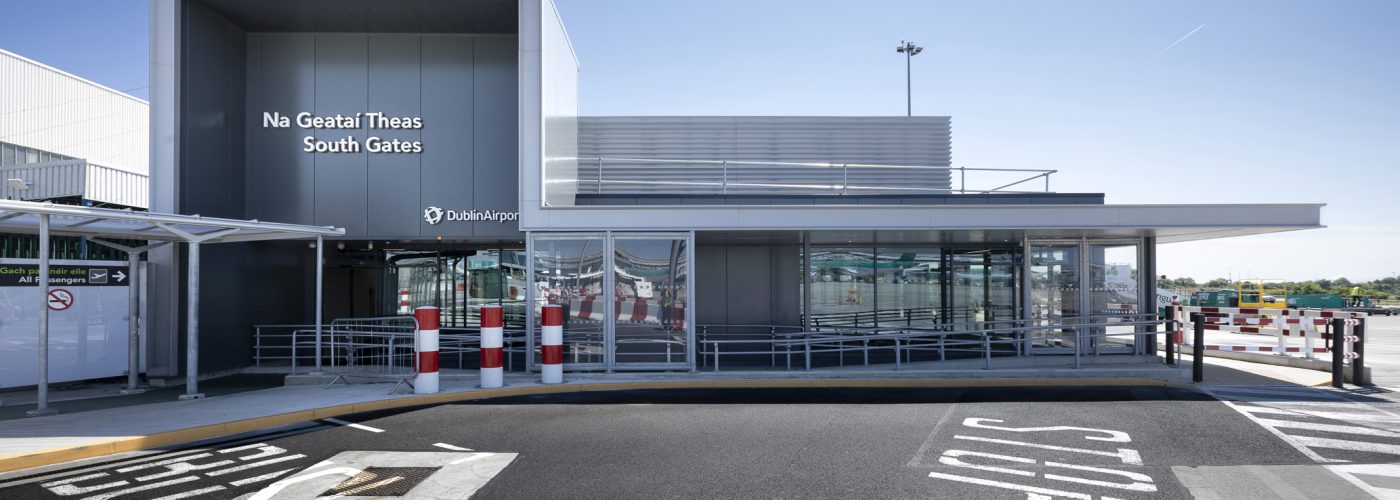The McAvoy Group has handed over a new passenger facility at Dublin Airport which was built offsite and at over 19m wide, is believed to be the largest single span modular building delivered to date in the UK and Ireland.
The new €22 million South Gates passenger boarding area has been developed to meet the huge growth in passenger numbers at Dublin Airport and will be used mainly by Aer Lingus for flights to the UK and continental Europe. It provides seven boarding gates to serve nine aircraft stands and is designed to accommodate around 8,000 passengers a day.
The management contractor for the project was Flynn Management & Contractors and the lead consultants were Arup. The building was designed by concept architects Kavanagh Tuite and delivered by project architects Blue Sky.
The 2,200m2 facility was constructed offsite at the McAvoy production centre in Lisburn, Northern Ireland to reduce time on site. It was craned into position in 16 days as 77 steel-framed modules. The building system was engineered to achieve over 19m wide uninterrupted clear spans, which is believed to be an industry first for modular construction. Hot rolled steel beams were used to remove the requirement for internal columns.
The building, which is around 120m long, has the flexibility to accommodate departing flights in the busy early morning period and flight arrivals in the evening. It can also be segregated so around 1,000 departing and arriving passengers can be processed at the same time. Facilities include boarding gates, a café, toilets, baby changing and a workstation area with plugs and charging points.
Dublin Airport has experienced a 6 per cent increase in passenger numbers in the past year and a record 29.6 million passengers used the airport in the last year.
Commenting on the new facility, Iain Heath, Project Manager at Dublin Airport, said, “This is one of the fastest projects we have ever completed at the airport – from planning to the first flight in just 18 months. The finished building speaks for itself. It is a handsome new facility with high quality finishes and clean architectural lines.”
“We were working to a very constrained programme to have the building operational ahead of the busy summer season. The project and its innovative use of offsite construction is a fantastic achievement for the whole team.”
“We were impressed with how McAvoy used BIM and virtual reality. As an airport we have a complex approvals process, but the digital techniques allowed the senior management team to ‘walk through’ the building and to experience the facility, which facilitated design sign off. In addition to the programme benefits, offsite construction also meant fewer trades working on site and a smaller site footprint. This approach had far less operational impact for the airport and the closure of fewer aircraft stands with reduced timeframes.”
Brian Looney, Contracts Manager at Flynn Management & Contractors said, “The principal driver for offsite construction was to reduce the programme. The McAvoy solution allowed the building to be delivered to site within weeks of planning approval. Having fewer trades on site is also a benefit for airport projects such as this where the site is very constrained, and the highest standards of security have to be maintained at all times.”
“This project has pushed the boundaries of offsite construction to create a valuable infrastructure facility. The quality of the finished building is excellent, and you would never know this is a modular building. The McAvoy Group’s production facilities are impressive, and their systems are robust. We would welcome the opportunity to work with their team again.”
Eugene Lynch, Managing Director of The McAvoy Group, added, “This project successfully demonstrates the potential for offsite to improve the efficiency of airport construction, particularly in the development of airside facilities where it is so critical to minimise any impact on existing operations. We can reduce work on highly secure and constrained sites and rapidly install the buildings in a fast and efficient process, with no compromise on design.”
McAvoy has already been shortlisted for two industry awards for the Dublin Airport project and its innovative use of BIM and virtual reality.
The Dublin Airport scheme was designed to meet stringent fire safety regulations that exceeded Building Regulations. All mechanical and electrical services – including data communications, fire and security – had to link into the existing live airport terminal systems, which was a hugely complex operation undertaken by McAvoy. A specially-designed ceiling solution provides a high standard of acoustics and its chequerboard appearance has created a strong visual feature.
Externally, the highly glazed building is finished in two shades of anthracite grey aluminium cladding to complement the other passenger terminals. A screen of grey louvres wraps around the roof to conceal services and the plant rooms.
For further information, visit www.mcavoygroup.com, call 028 8774 0372 or email info@mcavoygroup.com.





